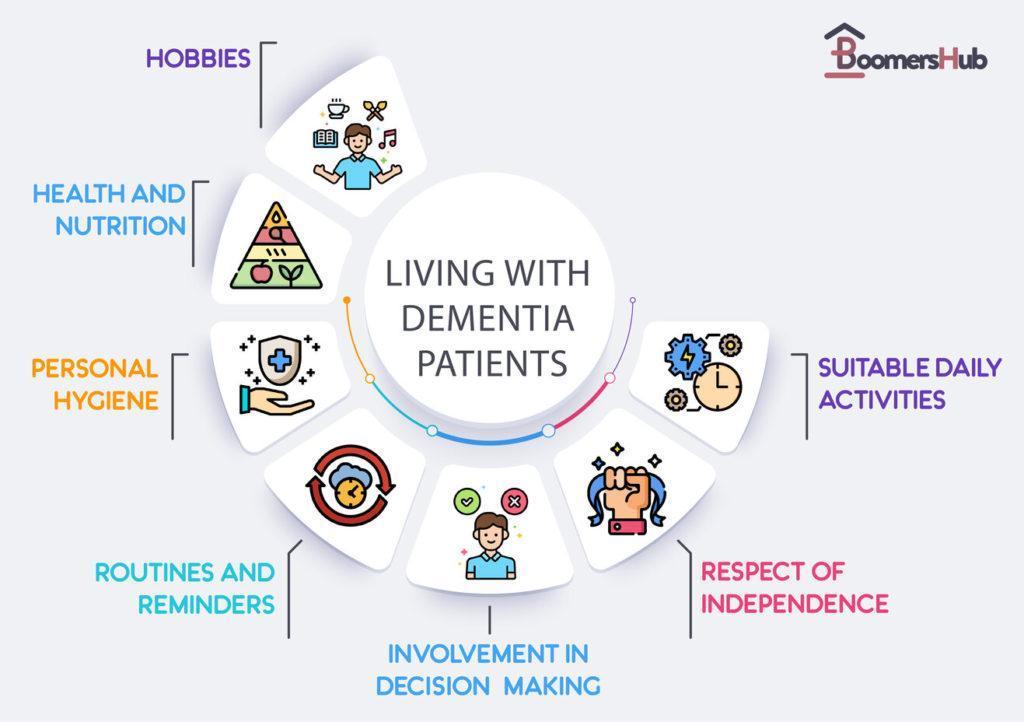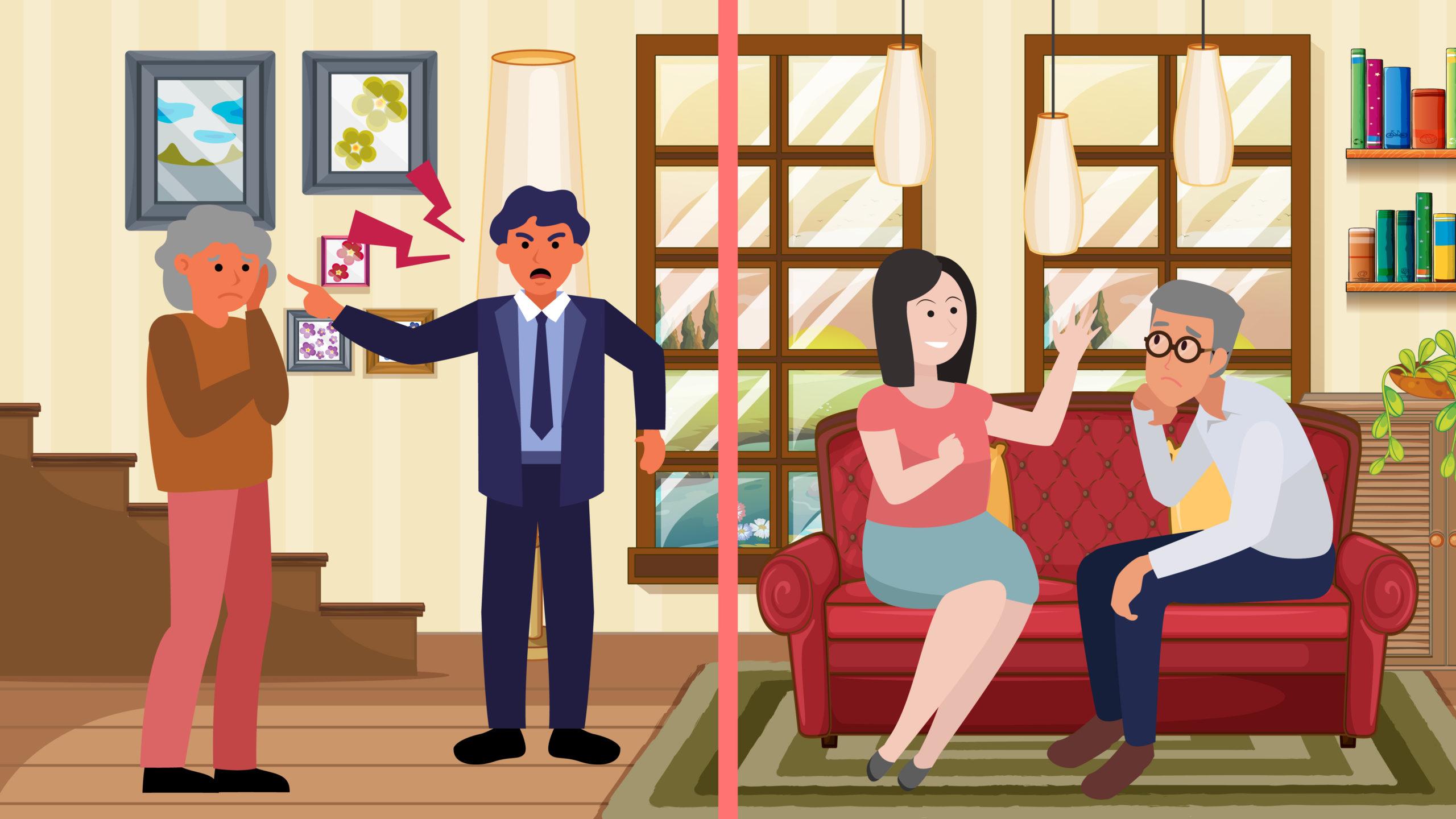Article Contents
Introduction
Do you know what percentage of seniors have dementia? According to studies, almost 63% older adults aged 80 or above has dementia, while the percentage is 2% for seniors between the age of 65 to 69. About 6 million Americans are currently suffering from various types of Dementia.
Suppose your loved one has recently been diagnosed with dementia. So, for the time being, you’ve decided to be their caregiver. Caregivers and families need to understand how to live with people with dementia.
Understanding how dementia works can affect the way your loved one reacts to the disease. After all, it’s not something that will go away on its own, so you need to make decisions that will help. You can do this by taking an informed and careful approach to the disease.
This blog post will guide you on taking care of and living with a dementia patient.
What to Do When a Loved One has Dementia?
Reassurance and support are two essential things needed by those with dementia. This helps them lead as independent a life as they possibly can. If you have a loved one in this condition, it’s only natural to want to assist them in any way possible.
After all, dementia relates to a series of symptoms associated with the mental decline of a person. These symptoms include:
- Loss of memory
- Difficulties with cognitive processes
- Issues speaking or properly articulating things
- Changes in mood and behavior
- Aggression
- Loss of sight and hearing
- Hallucinations
- Sleep disturbances
- Anxiety
- Hypertension
- Depression
- Insomnia
There are many different types of dementia. The most well-known of these is Alzheimer’s disease.
Common Dementia Behavior
1. Aggression
People with dementia may become cruel, lash out, or use combative statements or body language. Sometimes this type of anger may even evolve to physical clashes.
However, caregivers and families need to remember that this dementia behavior is often the sign of an underlying need.
Aggression can be a way of conveying:
- Physical pain. A person who doesn’t have dementia can go to the dentist for a toothache or make an appointment with a physical therapist if they’ve pulled a muscle. Individuals who have dementia may not reach out for help—often, aggression is their way of doing so.
- Emotional pain. Sometimes, agitation can be a sign that someone with dementia feels lonely, depressed, or isolated.
- Discomfort with a specific task. Does aggression come out specifically at bath time, bedtime, or while your loved one is getting dressed? These tasks may be triggers for aggressive behavior.
- Reactions to medications. Has your loved one recently changed medications? Do they experience difficulties with medication management? This might be interfering with their dementia diagnosis, leading to aggression.
- Vision or hearing loss. Issues with vision or hearing can compound the typical disorientation of dementia, causing seniors to act out in confusion or as a cry for help.
- Agitation at a certain time of day. Often, hostility can be attributed to sundowner’s syndrome. Does your loved one become aggressive around sunset in particular?
- Fear. People often react confrontationally when approached or touched by someone they don’t know. For seniors with dementia, who may not recognize caregivers, doctors, and community residents, daily interactions can alert a “fight or flight” response.
2. Confusion
Confusion is one of the most common dementia behaviors in the elderly. This could mean saying phrases like:
- “I want to go home!”
- “This isn’t my house.”
- “When are we leaving?”
- “Why are we here?”
Like many other dementia behaviors, confusion can often be attributed to triggers or root causes. Disorientation can stem from:
Problems with wayfinding and changes in the environment. Did your senior loved one move to a new place? Often, dementia behaviors like aggression peak shortly after an individual with dementia have to deal with a new routine.
Paranoia and hallucinations. Dementia leads to complex changes in the brain, which can result in delusion. As a result, seniors may see things that aren’t there, develop false beliefs, or become suspicious of caregivers and loved ones.
3. Poor judgment
Is your loved one neglecting to pay bills, making lavish purchases, or wearing clothes that are inappropriate for the season? These questionable decisions may signal a more significant problem with their mental state.
4. Manipulation
A person with dementia may invent truths to get what they want. Other displays of manipulation include refusing to listen or having emotional outbursts.
How do You Spend Time with a Loved One with Dementia?
Remaining supportive is the best way to help someone with dementia lead a happy life. Making them feel useful and able is very important.
In the early stages, memory loss is the first noticeable problem. Providing your loved ones with visual cues will help them find their way around the house.
As the condition progresses, helping them to retain their quality of life is extremely important. You can achieve this by including things like:
- Keeping up hobbies
- Maintaining health and nutrition
- Coping with bladder issues
- Helping with personal hygiene
- Aiding sleep
How to Live with People with Dementia?
Understanding how dementia work is essential to ensure that both you and the person with dementia can live as well as possible. There is no doubt that caring for someone with dementia can be frustrating at times. It may feel as though you’re going one step forward and several steps backward.
But it’s not always bad. Solving problems and becoming more confident with the care that you can provide will do you wonders. It will make you feel satisfied that you’re doing something. So often, relatives of dementia patients don’t know what to do. They end up feeling helpless. But you can make sure that things aren’t like that.
Much of what we know about dealing with this disease comes from the experience of caregivers. So, don’t think that you’re making a mistake or that you’re not helpful. You are, so be positive!
1. Setting routines and reminders.
Activities such as dressing, grooming, bathing, and eating can form a daily regime. These help the person with dementia know what to expect, and help them do things independently.
These things will help, particularly during the earlier stages of the disease. It is very easy to end up feeling helpless after learning that one has dementia. By doing things like leaving notes on the fridge or signs on a cupboard can be helpful.
If the patient can’t understand words anymore, try using color cues or pictures. Things like clothes laid out in the order they are to be put on will make it easier for him to get dressed. Your elder might need regular reminders to get him to go to the bathroom.
2. Decision-making and respecting the independence
If you are making decisions for a dementia patient, use the person’s wishes as a guide, not your personal opinions.
Recognize that the patient still has boundaries that need to be respected. Support her to make her own decisions and involve her in decision-making while she can.
Feelings and emotions remain intact long afterword, having lost their meaning. So, look for facial expressions, tone of voice, and body language cues.
3. Finding suitable activities
People with dementia often remember the distant past more quickly than the present. If you can find a way to trigger decent, pleasant memories, the patient can become more interested. Not everyone enjoys reminiscing, but the following suggestions might be useful for those who do:
- Talk about old things together, while looking at old family photos or books with pictures, or while listening to music.
- Make up a memory box of objects. Then, physically handling things trigger memories more effectively.
- A visit to a favorite place might also prompt happy memories and provide another opportunity to get out and about.

What To Do, What Not To Do With Dementia Patients?
Managing dementia behaviors in the elderly may be difficult. But it’s not an impossible task. Your words have the power to take control and dispel a major misunderstanding. If you are thinking about how to motivate seniors with dementia, our advice would be to choose your words carefully.
DOs:
- Try to identify the behavior’s cause.
- Keep your tone light and supportive.
- Redirect your loved ones by involving them in another activity or conversation.
- Remove your loved one from environments that may be overstimulating.
Natural reactions to dementia behaviors can be ineffective or make the situation worse.
DON’Ts:
- Physically restrain your loved one unless necessary.
- Respond to aggression with similar behavior. For example, yelling at an angry loved one may raise tension and emotions.
- Approach your loved one from behind, as this can make them fearful or anxious.
How to Manage Repeated Questions and Confusion?
According to the American Psychological Association, asking questions repeatedly and not understanding why things are happening are symptoms and behaviors that come with dementia.
KEYNOTE
DOs:
- Communicate with simple, direct language.
- Use photos and other tangible items as props to explain situations.
- Remain calm and supportive.
DON’Ts:
- Rely on lengthy explanations and reasoning, as this may further overwhelm your family member.
How to Help with Cognitive Issues?
Deterioration of the brain cells can lead to poor decision-making. Some of the associated symptoms are obvious. These include hoarding household items, accusing a family member of stealing, or forgetting how to do routine tasks.
It’s important to minimize frustration and embarrassment for dementia patients. Know what works best for them and incorporate it into your caregiving strategy.
DOs:
- Listen and offer subtle help.
- Work together to resolve the issue.
- Make a task more manageable by breaking it down into smaller steps.
DON’Ts:
- Blatantly question your loved one’s ability to handle tasks and decisions. This could further alienate your senior family member.
- Hold dementia behaviors against your loved one.
- Bring up events to prove or disprove statements.
- Engage in heated arguments.
If you care for a dementia patient and feel resentment or depression, do seek out professional support. There are various ways to ensure that your spirits stay lifted. Similarly, there are multiple ways to make sure that your loved one is taken care of as well.
Although there is no cure for the disease, medications, dementia therapies, and memory care communities may help.
Find More Resources about Dementia Patients Care from BoomersHub
Conclusion
It can be quite tricky to live with people with dementia, but it’s understandable. Family is essential, so it’s not a surprise that you want to do something for your family. Therefore, this post has been written to help with any issues you face when dealing with loved ones with dementia.
Frequently Asked Questions
Can extreme stress cause dementia in seniors?
Chronic stress affects the immune system and can be linked to dementia in seniors. To learn more about what causes dementia in seniors, check out our Dementia Resource Guide.
Does Medicaid cover senior dementia homes?
The Medicaid Waiver Program covers dementia care in assisted living or memory care in most states.
Does a senior with dementia need to see a neurologist?
It is always recommended to consult a specialist if someone is diagnosed with Dementia. But a primary care doctor can also be consulted if a person is experiencing early dementia symptoms such as changes in behavior, confusion, etc.
How seniors can fight dementia?
Unfortunately, dementia is not curable. But regular exercise, a balanced diet, giving up harmful habits (e.g., smoking, alcohol consumption), and socialization can have positive impact on the mind and overall health. It can help offset the progression of dementia.
How to calm seniors with dementia?
To calm seniors with dementia, it is important to listen to them carefully. Make sure you are patient with them and talk to them gently, without showing any irritation or urgency. You can try holding their hands or touch their shoulders and say reassuring words, like ‘’I am here for you’’, ‘‘you are safe’’, ‘‘everything is okay’’, etc. Apart from that, music, pets, or aromatherapy can also be effective in calming them.

